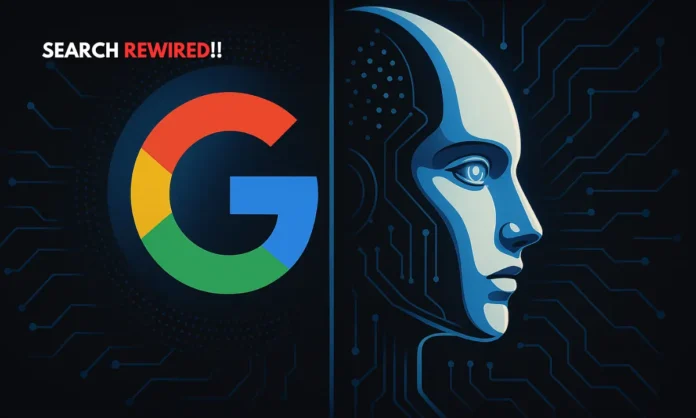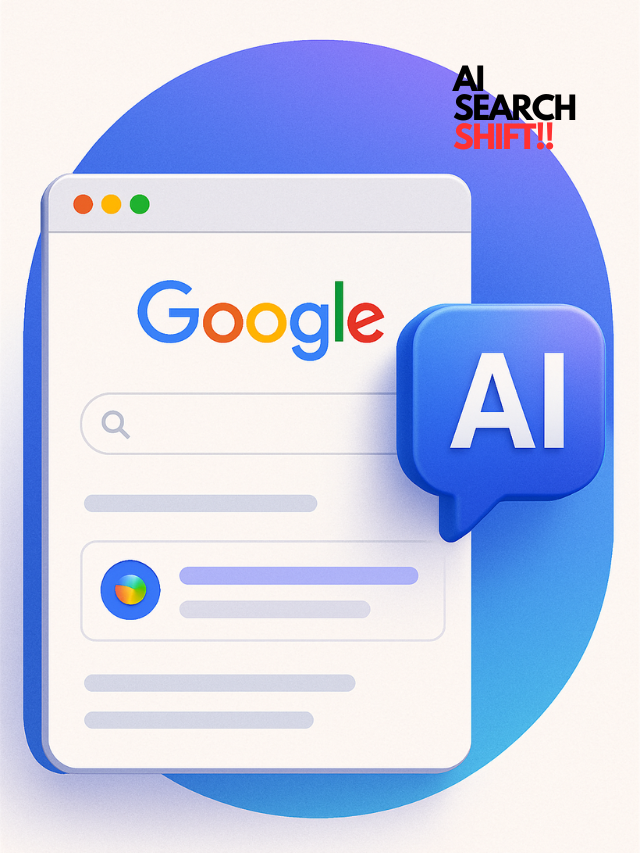Summary
- Google has launched “AI Mode,” a conversational chatbot layer integrated into its search engine—marking the most radical shift in two decades.
- The move comes amid rising threats from OpenAI, Apple, and antitrust lawsuits, as Google races to disrupt itself before others do.
- With real-time reasoning from Gemini 2.5 and AI-powered shopping, Gmail, and Chrome tools, the search giant is betting big on ambient AI—but risks losing its core.
From 10 Blue Links to Full Sentences: Search Will Never Be the Same
For 25 years, Google defined the way humans access the internet. You typed. It ranked. You clicked. But this era is ending. This week, Google unveiled “AI Mode,” a conversational interface built into its flagship search product. It allows users to ask complex questions, follow up with refinements, and receive nuanced answers powered by Gemini 2.5—the company’s most advanced AI model to date.
Sundar Pichai, Google’s CEO, called it a “total reimagining of search.” And he’s right. AI Mode represents not just an upgrade, but a full pivot—away from page rankings and toward generative conversation. It’s a response to pressure. The arrival of ChatGPT triggered what insiders called a “Code Red” within Google. For the first time in its history, the search giant faced a credible threat to its core business.
The stakes are colossal. Search brought in nearly $200 billion for Google last year—over half its revenue. But AI is changing user expectations. And while tools like Gemini offer smarter summaries and email replies, they also raise the same existential questions: Can generative AI be trusted? And if it bypasses websites, who loses?
This article explores Google’s latest transformation—from reluctant AI adopter to aggressive AI innovator—and what it means for the future of the internet.
Google is rolling out AI mode in the search!
— Python Space (@python_spaces) May 21, 2025
This is literraly a gaming changing in search. pic.twitter.com/w3zJYXSFED
Gemini 2.5 and the Rise of Ambient AI Assistants
- Gemini 2.5 Pro introduces “reasoning capabilities” and deeper personalization for search, email, and shopping.
- Google is integrating Gemini into Chrome, Gmail, and even glasses, betting on ubiquitous assistants.
- New Gmail tools can read your inbox tone and draft replies in your voice.
- Shopping chatbots can now buy items for you when prices drop—automatically.
Google’s new ambition is not just to compete with AI upstarts—it’s to dominate ambient computing. Gemini 2.5 isn’t just a chatbot upgrade; it’s the engine behind AI Mode, Chrome’s website summarizer, Gmail’s tone-matching smart replies, and Google’s new shopping tools. At its core, Gemini is built to reason—not just search.
For instance, it can scan a user’s inbox and calendar to draft personalized emails or recommend itinerary tweaks. Its shopping assistant can identify a rug that matches your gray couch and buy it the moment it goes on sale within your budget.
The company also introduced a developer suite—Google AI Ultra—priced at $250/month, giving professionals access to Gemini’s most advanced capabilities. It’s a clear signal that Google is ready to compete with OpenAI’s ChatGPT Pro and Anthropic’s Claude:Max.
Even more futuristic: Google is reviving its AR glasses experiment. Android XR glasses, still in prototype, can recognize people and translate languages in real-time using Gemini. It’s an early glimpse of a world where search doesn’t begin with a keyboard—but with your eyes and voice.
Search Disruption from Within: Why Google Is Racing Against Itself
- Google’s search traffic has declined for the first time in 22 years, according to Apple’s Eddy Cue.
- AI chatbots like ChatGPT are increasingly becoming default gateways to digital information.
- Google’s new AI Mode won’t serve ads initially—raising big monetization questions.
- The shift could undercut publishers and trigger further antitrust scrutiny.
AI Mode isn’t just a bold product move—it’s a preemptive self-disruption. For the first time, Google is openly cannibalizing its traditional search business to stay relevant in the post-ChatGPT era. And the data shows why: internal testimony from Apple revealed a drop in Google search usage, a historic first.
The shift is risky. Google’s dominance rests on monetizing queries via ads—ads that appear alongside traditional search results. AI Mode, in its current form, doesn’t show any. Instead, it delivers complete answers, reducing clicks and potentially slashing publisher traffic and ad revenue.
This has already drawn concern from the publishing world. AI-generated overviews often lift content without attribution, leading to accusations of information scraping. Google insists that its AI Mode leads to “longer sessions and deeper engagement,” but publishers aren’t convinced. Nor are regulators.
With the U.S. government pursuing antitrust action and arguing that Google should open up its data to rivals, this pivot will be scrutinized not just by users—but by lawmakers.
Trust, Truth, and the AI Paradox
- Google has historically been conservative with AI to protect its brand and product integrity.
- Past blunders—like AI suggesting people eat rocks—highlight hallucination risks.
- Accuracy vs. immediacy remains a fundamental tension in AI-powered information delivery.
- Google must rebuild trust while experimenting with the most disruptive tech of its generation.
AI is dazzling—but it’s also dangerous. Google knows this better than anyone. Its own AI once infamously recommended “eating rocks” as a health remedy. And with every hallucination, the company’s credibility is on the line.
This is perhaps why Google waited—too long, critics say—to embrace generative AI. Pichai himself admitted that the company was cautious, fearing low-quality results and unclear monetization. But now, the race is underway, and Google can no longer afford restraint.
Still, trust is a tightrope. If AI Mode becomes the new face of search, its answers must be factual, unbiased, and verifiable. That’s a far harder problem than ranking websites. It’s a knowledge generation task—and even Google admits it’s not foolproof.
The paradox is stark: to maintain its empire, Google must rapidly adopt a technology that could make its core business—and reputation—obsolete. That tension is what makes this transition both necessary and perilous.
The Internet’s Gatekeeper Is Becoming Its Interpreter
Google’s journey from a ranked-index search engine to a reasoning-based AI assistant signals a profound shift—not just for the company, but for how humans interact with the internet. Search is no longer a box to type into. It’s becoming a conversation, an agent, a whisper in your ear telling you which rug to buy and what email to send.
Whether this transformation empowers users or narrows their worldview depends on how responsibly it is built and monetized. If it fails, Google risks handing the keys to the internet to OpenAI, Apple, or some new contender. If it succeeds, it will reshape the global information economy for a second time.
The race isn’t over links anymore—it’s over logic, language, and trust. And Google, once the gatekeeper, now has to prove it can be a reliable interpreter.



